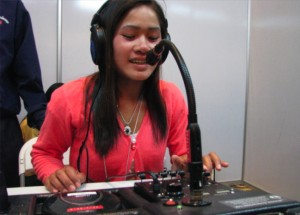By Stanislaus Jude Chan
Like many of her fellow villagers, 22-year-old Khampheng Manivone first heard about  community radio when letters were sent to different villages in Khoun – one of the poorest districts in Laos – asking for volunteers to be part of the Khoun Community Radio Development (KCRD) project.
community radio when letters were sent to different villages in Khoun – one of the poorest districts in Laos – asking for volunteers to be part of the Khoun Community Radio Development (KCRD) project.
Khampheng jumped at the chance to apply as one of the first few volunteers to join Khoun Radio in July 2006, more than a year before its first test broadcasts in late October 2007.
The station, which reaches out to community groups through local programming, aims to improve the people’s access to information and increase residents’ participation in development-related decisions, today broadcasts seven days a week, seven and a half hours a day, in three local languages – Lao Lum, Hmong and Khmu.
“Before I joined the station I was very shy, I couldn’t speak in front of many people, even with people in the village. But now, I can speak in public with confidence. And when I join outreach activities organised by the station, I can speak with people and work with people and I have learnt many things,” said Khampheng, a delegate at the Mekong Media Forum being held in this northern Thai city until Dec. 12.
The volunteer broadcaster now also heads the Khmu programme production group at Khoun Radio, a project put up by the United Nations Development Programme (UNDP) with the support of Laos’ information and culture ministry and the Xiengkhouang Province Department of Information and Culture.
“We are a people who do not like to talk too much, because we don’t want to hurt people,” said Vongsone Oudomsouk, project manager of the Khoun Radio project, of the popular stereotype of the Lao people. “But 50 percent of volunteers are now made up of villagers, who act as representatives of their communities.”
Production of the radio programmes are done in collaboration with the villagers, Vongsone explained, emphasising on the importance of community involvement at Khoun Radio. “Villagers actually take part in decision making processes, what to produce, when to broadcast, in how many languages, and so on.”
And it is this inclusive approach, and the airing of topics relevant to the community, that has resulted in positive change for the people of Khoun district.
Speaking at a satellite session, ‘Empowering Local People Through Community Radio’, held on Dec. 10 at the Forum, Vongsone recounts anecdotal evidence that points to the success of Khoun Radio in assisting development in the district. For example, some doctors he spoke to had previously tried – unsuccessfully – to promote vaccination for babies, because villagers did not understand it and were not receptive to the idea. But after the airing of radio shows discussing this issue, these doctors have reported an increase in vaccination rates.
The Khoun Radio project is part of plans by the Laos government to introduce community radios in all of the 47 poorest districts of the country by providing a platform for the community to discuss issues of local interest, including agriculture, health, and education.
On top of the improvement in information flow and increased community involvement in development issues, delegates at the session here also discussed the importance of community radio as compared to mainstream media.
Cai Yiping, executive director of women’s rights group Isis International, explains that the content in community-based media is often more relevant and useful to the audience. “In community radio, because the audience is also the producer, they are the ones who know what information they need,” she said.
Forum participants also turned the spotlight on another difference between the two media models: unlike mainstream media, non-commercial community radio struggles to stay financially sustainable. For example, Vongsone says, the station had previously turned away advertisers for motorcycles and milk powder because of concerns within the communities over the socio-cultural impacts these products might bring.
To this end, Vongsone hopes for the station to be able to work out some form of “partnership strategy” with organisations that share “the same aim of getting the Khoun area out of poverty”. He is also looking to set up a “volunteers fund” to offer financial assistance to Khoun Radio volunteers, who currently receive only a small allowance for their time and services.
But for some volunteers, like Khampheng, it matters little whether she is paid. More importantly, “it’s something that I like, something I’m interested in, and I want to be part of the development of my community,” she said.







